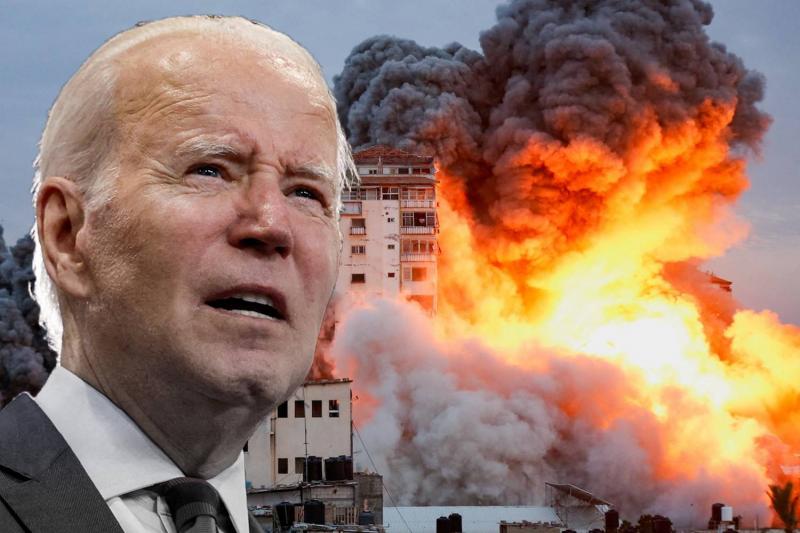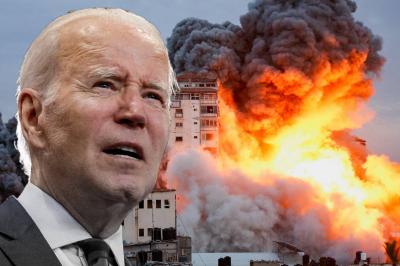Until the end of last week, the administration of U.S. President Joe Biden was relying on a relatively calm Middle East while quietly pursuing its main political goals in the region, which involved mediating a breakthrough between Israel and Saudi Arabia and containing Iran’s nuclear ambitions.
However, these hopes were shattered when fighters from the Palestinian Islamic Resistance Movement (Hamas) infiltrated Gaza and stormed Israeli towns, military sites, and settlements on Saturday, resulting in hundreds of deaths and dozens of captives. The Israeli forces responded with heavy bombardment that killed hundreds in the coastal enclave and imposed a full blockade. After avoiding intervention in the intractable Israeli-Palestinian conflict, Biden now finds himself thrust into a crisis that is likely to reshape his policy in the Middle East, in a partnership with right-wing Prime Minister Benjamin Netanyahu that he may not feel comfortable with. This situation is politically perilous for a president seeking re-election in 2024, and could have significant ramifications for global oil prices, diverting U.S. resources and attention away from what has so far been the central challenge in his foreign policy: Russia's war in Ukraine.
### A Strong Blow to U.S. Peace Efforts in the Region
Hamas's surprise attack dealt a blow to U.S. efforts to broker a historic normalization agreement between Israel and Saudi Arabia, creating obstacles for Washington's approach toward Iran, which has long sponsored Hamas. U.S. officials maintain that attempts to establish relations between the old adversaries Israel and Saudi Arabia could survive the crisis unscathed, but many experts are more pessimistic. John Alterman, head of the Middle East Program at the Center for Strategic and International Studies, diverging from the official government line, said, "Simply put, all normalization efforts will remain suspended for the foreseeable future." The U.S. administration viewed the combination of Washington’s two strongest allies in the region as a stronger bastion against Tehran and a way to prevent advancing Chinese influence in the oil-rich Gulf region. John Kirby, spokesperson for the White House National Security Council, said he would not go so far as to say that the normalization talks have been temporarily halted or that they have become a lower priority, but he noted that Washington's focus is currently on helping Israel defend itself.
Reiterating this view, a source familiar with Saudi thinking stated it would be difficult to "talk about normalization during another Arab-Israeli war." Jonathan Panikoff, a former senior official in the U.S. National Intelligence, said, "The Arab street will not support normalization after a large-scale war has destroyed a significant portion of Gaza." The crisis also sparked renewed criticism of the Biden administration's efforts to establish relations between Israel and Saudi Arabia, which has largely been viewed as neglecting the Palestinian quest for statehood. Khaled Al-Jundi, a former advisor to the Palestinian negotiation team, accused the Biden administration of leading an Israeli-Saudi normalization process that largely overlooks the Palestinians. Al-Jundi, who currently works at the Middle East Institute, said, "Such neglect is one of the reasons behind what we are witnessing."
Hamas sent a message indicating that Palestinians cannot be ignored if Israel wants security, and any Saudi deal would disrupt the recent rapprochement between the kingdom and Iran, according to Palestinian officials and a regional source. Earlier, U.S. officials indicated that the time was not right to attempt to resume the long-stalled Israeli-Palestinian negotiations due to intransigence from both sides. Panikoff stated that Riyadh may return to the negotiating table for long-term U.S. security guarantees against Iran. Analysts suggest that the Biden administration, even as it helps Israel combat Hamas and seeks to free dozens of hostages, including potentially American citizens, could attempt to craft a strategy aimed at least at keeping the option of establishing a Palestinian state alive. However, Netanyahu, whose far-right government is already resistant to the concessions sought by both Washington and Riyadh, will oppose making any concessions to the Palestinians given the rising death toll and the hostage crisis.
### The White House Caught Off Guard
U.S. National Security Advisor Jake Sullivan stated just over a week ago at a conference sponsored by The Atlantic that "the Middle East is quieter today than it has been in two decades," suggesting that the administration could focus more on priorities like the war in Ukraine and the rising Chinese influence in the Indo-Pacific region. U.S. officials indicated that Biden's aides, who were leading efforts to normalize relations between Israel and Saudi Arabia in exchange for a defense agreement sought by Riyadh, were completely taken by surprise by Hamas's attacks. Hamas's assault is already drawing the U.S. administration deeper into the troubled Middle East, with Biden promising additional military aid to Israel and deterring any entity from exploiting the situation. Biden spoke at the White House about the "absolute evil" unleashed by Hamas and detailed what he said were atrocities committed against Israelis. He pledged, saying, "We stand with Israel."
Administration officials say the immediate challenge is preventing the war from escalating into a broader conflict, particularly by preventing the Iran-backed Lebanese Hezbollah from opening a second front on Israel’s northern border. A U.S. official, speaking on condition of anonymity, noted that some of Biden's aides were disappointed by the lack of a direct condemnation of Hamas's attack from the Saudis. The U.S. pressed for a condemnation from Saudi Arabia, likely during a phone call between U.S. Secretary of State Antony Blinken and Prince Faisal bin Farhan; however, the Saudi Foreign Minister did not respond to this request, according to the source familiar with Saudi thinking. The source told Reuters, "Saudi Arabia is not close to Hamas, but it cannot ignore how Israel has besieged Gaza for years and what it is doing in the West Bank." In contrast, the UAE described Hamas's attack as a "serious escalation." The Gulf state, along with its neighbor Bahrain, recognized Israel in 2020 under the Abraham Accords brokered by the Trump administration. Ibtisam Al-Ketbi, president of the Emirates Policy Center, a research center based in Abu Dhabi, stated, citing shared national interests, that the emerging relationships between the two Arab states and Israel "have withstood previous rounds of conflict between Israelis and Palestinians, and are likely to withstand the current round."
### Boldness for Iran?
Analysts suggest that the U.S. may have to reassess its approach toward Iran in the wake of the attack, which praised Hamas's assault but denied any direct role in it. Since taking office, Biden's political record has included failed efforts to negotiate with Tehran for a return to the nuclear deal. Tehran denies seeking nuclear weapons. U.S. officials claim Iran is complicit in the attack on Israel due to its long-standing support for Hamas but have no evidence directly linking Tehran to the assault. Some analysts noted that Iran may feel emboldened to escalate the "shadow war" with Israel after seeing armed incursions violate the Israeli military's reputation as an invincible army, potentially utilizing its regional proxies more to target U.S. interests in the region. Panikoff, who now works at the Atlantic Council, said, "Iran may be less deterred right now, whether that is true or not, because it sees the U.S. administration as less willing to engage in military conflict or take actions that would threaten that." Biden also finds himself needing to defend against criticisms from Republicans regarding a recent prisoner exchange deal with Iran last month, which U.S. officials indicated could be a confidence-building measure and the unfreezing of $6 billion in Iranian funds for humanitarian purposes.




